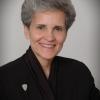Over eight years ago, I had a conversation about table manners that continues to challenge me. At the time I was a canonical novice and fairly new to religious life. During that stage of formation, I was trying to make sense of what it meant to be a Catholic sister and sort through my ideals. I was in a period of serious discernment about whether this religious lifestyle would satisfy my deepest desires, to take a vow of poverty and to serve the poor.
The Southern African Catholic Bishops' Conference condemned the murder of an elderly nun who was found bound in her room at a convent in Ixopo, South Africa. Sr. Stephanie Tiefenbacher, 86, a member of the Missionary Sisters of the Precious Blood and an Austrian national, was discovered by another sister early April 19.
"You walk toward trouble, you don’t walk away from it. You walk toward it so you can embrace it and hold it and help people who are suffering."
See for Yourself - Live theater is exciting. Although viewing a play on a movie screen or on TV is entertaining, live theater brings the show to life in a way that can't be captured on film. Recently I had the privilege to be in the pit orchestra for a community production of "Peter Pan." This was the famous 1954 Mary Martin Broadway version.
Global Sisters Report has been online for a year, and we've put together a short video about some of the stories that have been featured on our site. It's a nice summary of the work sisters do. Please feel free to share "Catholic Sisters in Service" with your friends.
In my March 12 column, I promised to revisit the creative gender policy approved by the Catholic Bishops' Conference of India (CBCI). This 2010 document has the ambitious goal of integrating gender justice into societal structures at every level of the Indian church, from the parish to the bishops' conference itself. An important objective is "to stimulate reflection in the Church on its mission to form a discipleship of equals," with "the ultimate goal [being] to achieve gender equality."
GSR Today - Anniversaries are about asking questions and taking stock. If it’s a relationship: Are we happy? Are we moving forward? Are there more good times than bad? If it’s an undertaking: Is it working? Is it sustainable? Is it worth the trouble? Pretty daunting, this taking stock, especially if it’s Global Sisters Report, which feels to me like an undertaking and a relationship. But today marks GSR’s one-year anniversary.
As Global Sisters Report celebrates our one-year anniversary, we are also celebrating the connections we have made with sisters in Africa. While in Kenya in January, I ran two writing workshops for more than 100 sisters. Here is more of their work.
Some 183 women and children seeking asylum are held at the Karnes County Residential Center, one of two family detention centers in south Texas operated by companies under contracts with Immigration and Customs Enforcement. Their plight is drawing increasing attention, fueled on the inside by a hunger strike and fast, and, on the outside, by legal jockeying and a recent visit by the head of ICE. At the heart of the matter are complaints of lengthy stays in prison-like conditions, as well as a question repeatedly posed by activists, attorneys and faith-based organizations.
"Religious women change the world with actions and not just words."





